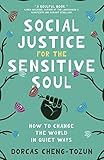In almost every nonprofit or social enterprise job I’ve had, at least one coworker terrified me. There was the boss who gave unexpectedly negative feedback on my performance review. There was the director who had sudden, inexplicable outbursts of anger and frustration. There was the colleague who asked pointed questions, one after another, staring at me intensely and unrelentingly until I responded. There was the manager who frequently sent angry emails in ALL CAPS, punctuated with rows of exclamation marks.
Not surprisingly, I had a hard time working with these individuals. They caused me intense stress and anxiety. Yet in hindsight, I find that I deeply value those colleagues. I appreciate the ways in which they pushed me beyond what was comfortable and the ways I grew as a result.
In any discussion about sensitives and empaths like myself, it is easy to focus on the negative aspects of being around those who aren’t like us. And while it is vital to set boundaries with toxic people in your life—including in social justice work—it’s also healthy to create space for “nonsensitive” peers who genuinely care about you and the social good. They may come across as prickly or aggressive, but they also bring many gifts to the table.
My nonsensitive colleagues have wowed me time and again with their confidence, persistence, resilience, and risk-taking. They are willing to fight the battles that I can’t, taking on the adversaries I would sooner run away from. They aren’t afraid to say hard truths or challenge long-held assumptions. They see and pursue opportunities that intimidate me. They help me to see what’s possible, and their efforts amplify my own.
Social justice work is complex and dynamic. It demands people who bounce back more quickly, who eagerly jump into the fray. We need colleagues who will challenge our assumptions in private and readily come to our defense in public. Their strengths counterbalance our strengths.
I still struggle with criticism and strongly worded emails. But I’d like to think that I’m a healthier version of my highly sensitive self: willing to take action a little sooner and better at understanding what’s worth processing and what’s worth letting go.
In a sphere like social justice, conflict and resistance are inevitable. When the warrior activists take on the louder, messier fights, they create space for us priestly advisers to work in more subtle ways. When we can respect and appreciate our differences, creating space for one another’s skills and gifts, there’s so much more we can accomplish.
From Social Justice for the Sensitive Soul: How to Change the World in Quiet Ways by Dorcas Cheng-Tozun copyright © 2023 Broadleaf Books. Reproduced by permission.













